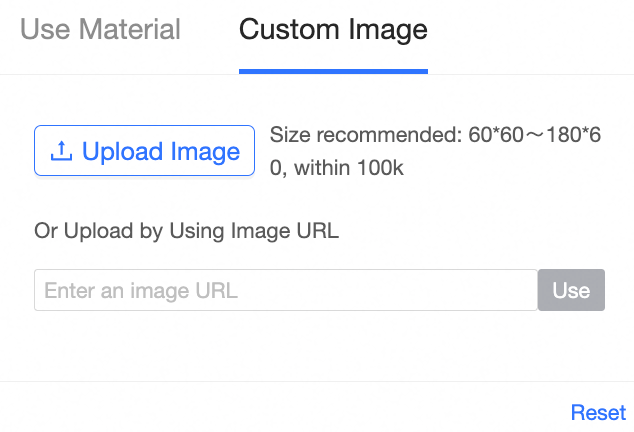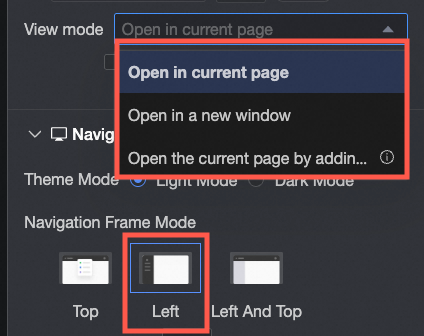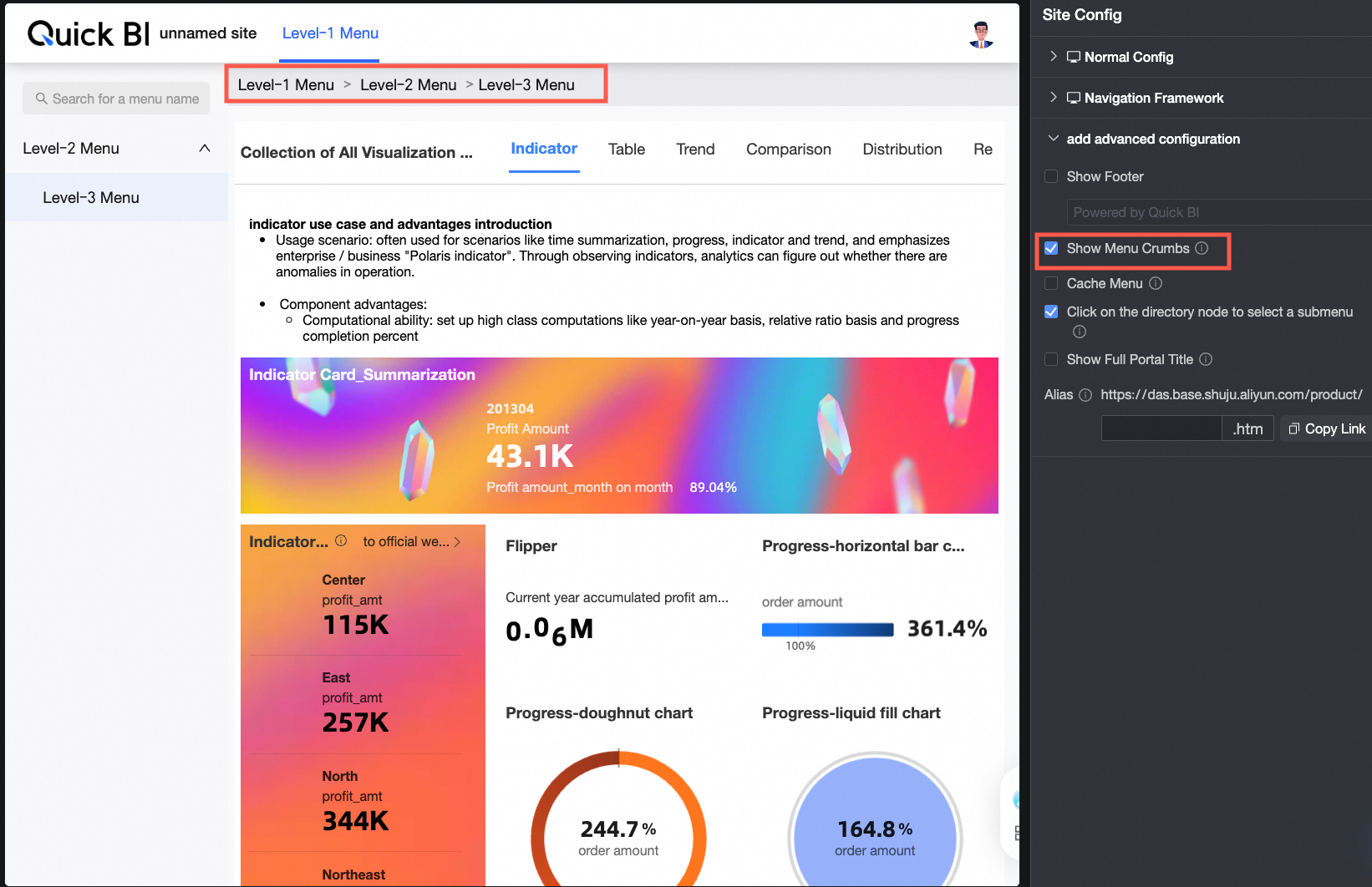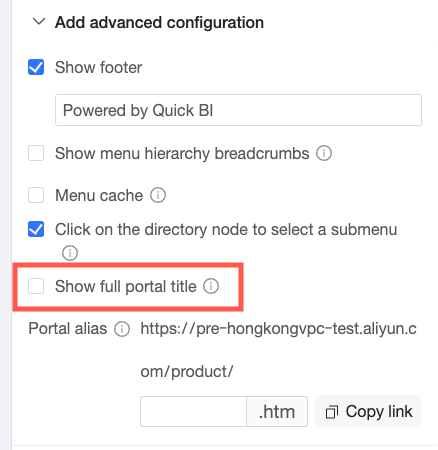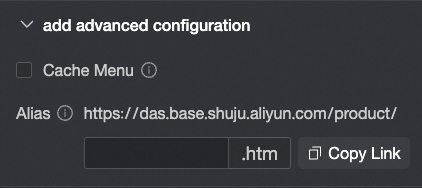A BI portal is a centralized hub that consolidates various data works such as dashboards, workbooks, data dashboards, ad hoc analysis, data reporting, and downloads, along with external links, into a menu-driven interface. By creating a BI portal, you can craft intricate navigation menus for thematic analysis. This topic guides you through the process of establishing a PC BI portal.
Portal Configuration
To configure the PC portal, use the terminal slider at the top of the page and switch to the ![]() icon.
icon.
Operation Entry
Click the Portal Settings icon at the top.
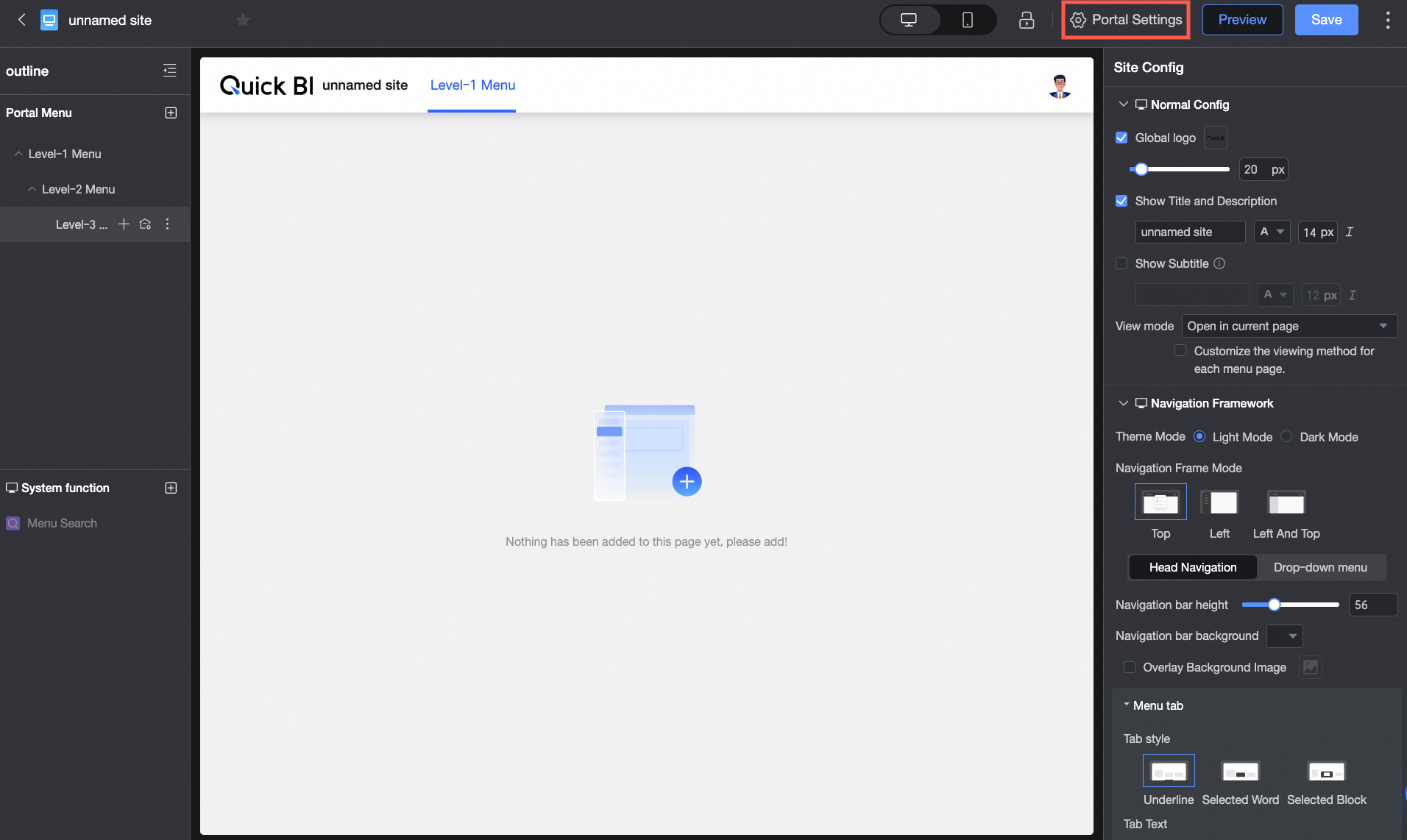
When you are configuring the menu, you can access the portal configuration interface by clicking Portal Configuration.
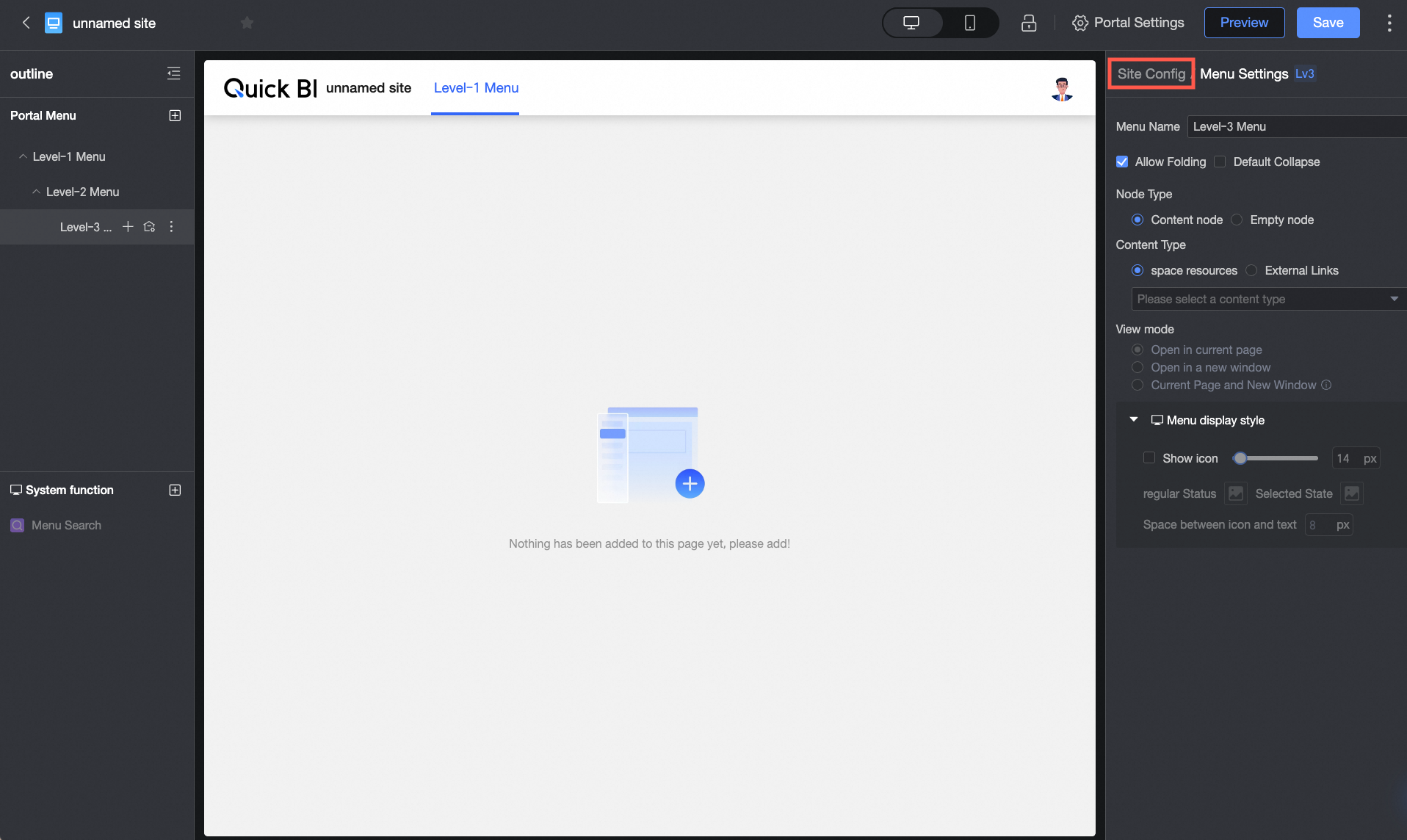
Basic Configuration
Configuration item | Description |
Global LOGO |
|
Display main title | Support selecting whether to display the main title and configure the name and text style of the main title. |
Display subtitle | Support selecting whether to display the subtitle and configure the name and text style of the subtitle. |
Viewing method |
|
Navigation Frame
Within the navigation frame, you can customize the theme mode, along with the navigation frame pattern and style.
Theme Mode
Options include light mode and dark mode.
Light Mode
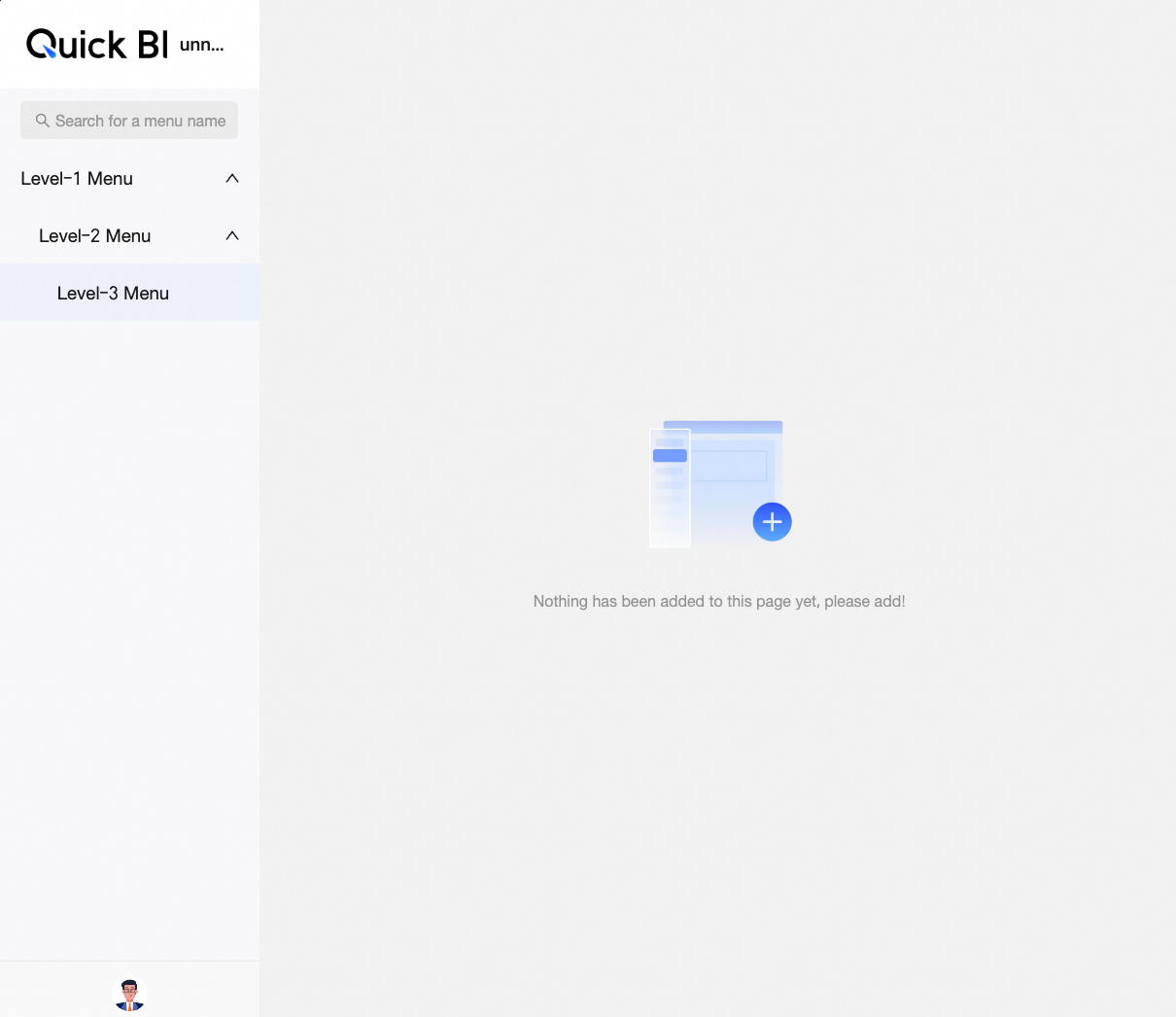
Dark Mode

Navigation Frame Pattern
Choose from top navigation layout, left navigation layout, or dual navigation layout.
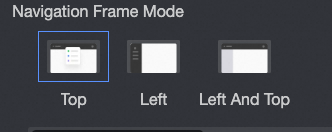
Top Navigation Layout
Configuration item
Description
Header navigation
When the navigation frame pattern is set to top navigation layout and dual navigation layout, support configuring header navigation:
Navigation bar height
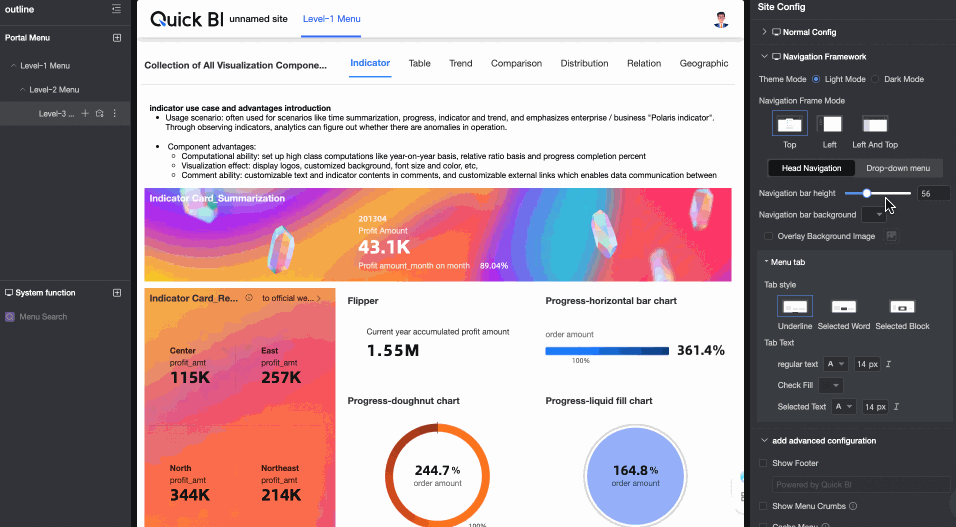
Navigation bar background
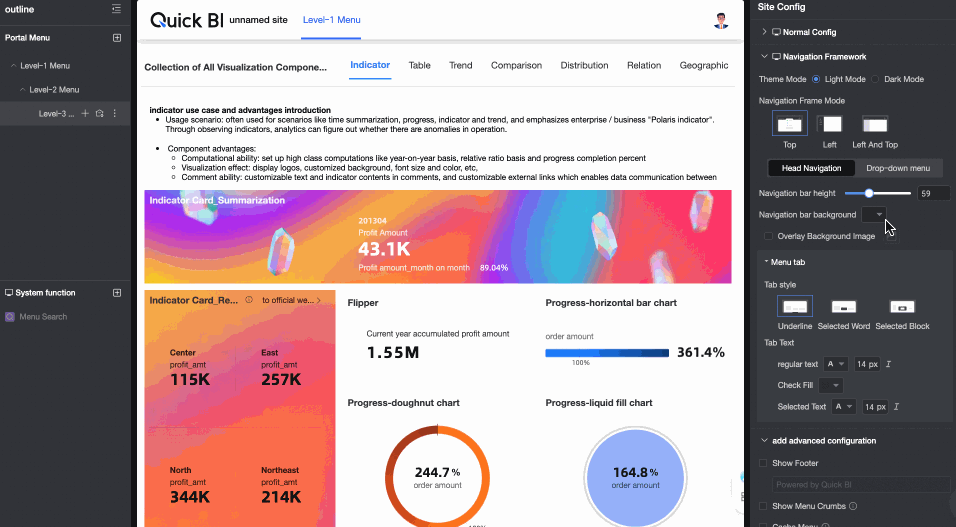
Overlay background image
After selecting, support uploading custom images. Uploaded local images only support jpg, jpeg, png, gif, svg formats, maximum 1M.
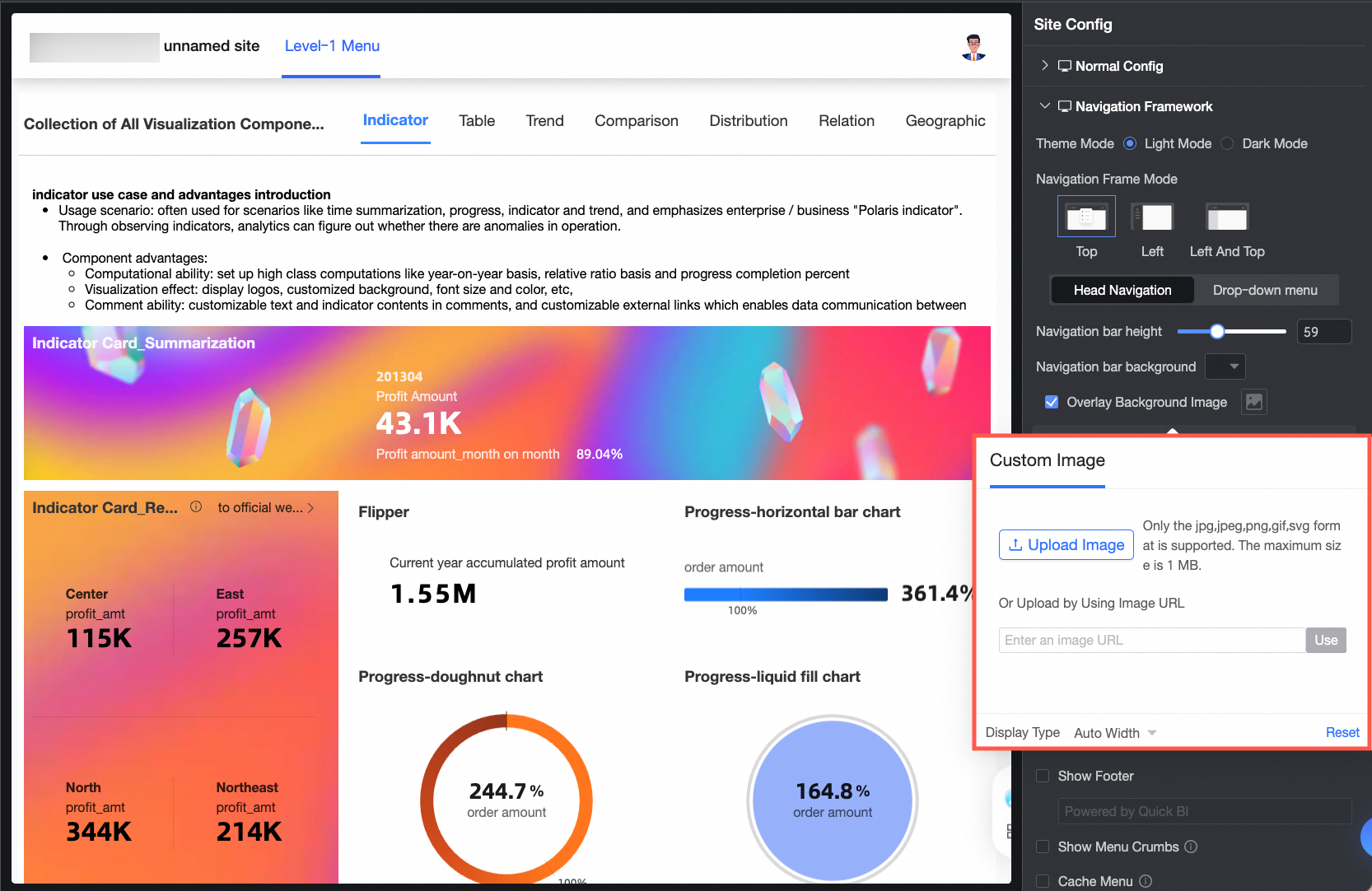
Tab style
Support underline, selected word, and selected block.
Tab text
Support setting regular text style, selected fill color, and selected text style. The selected fill color only takes effect in the selected block..
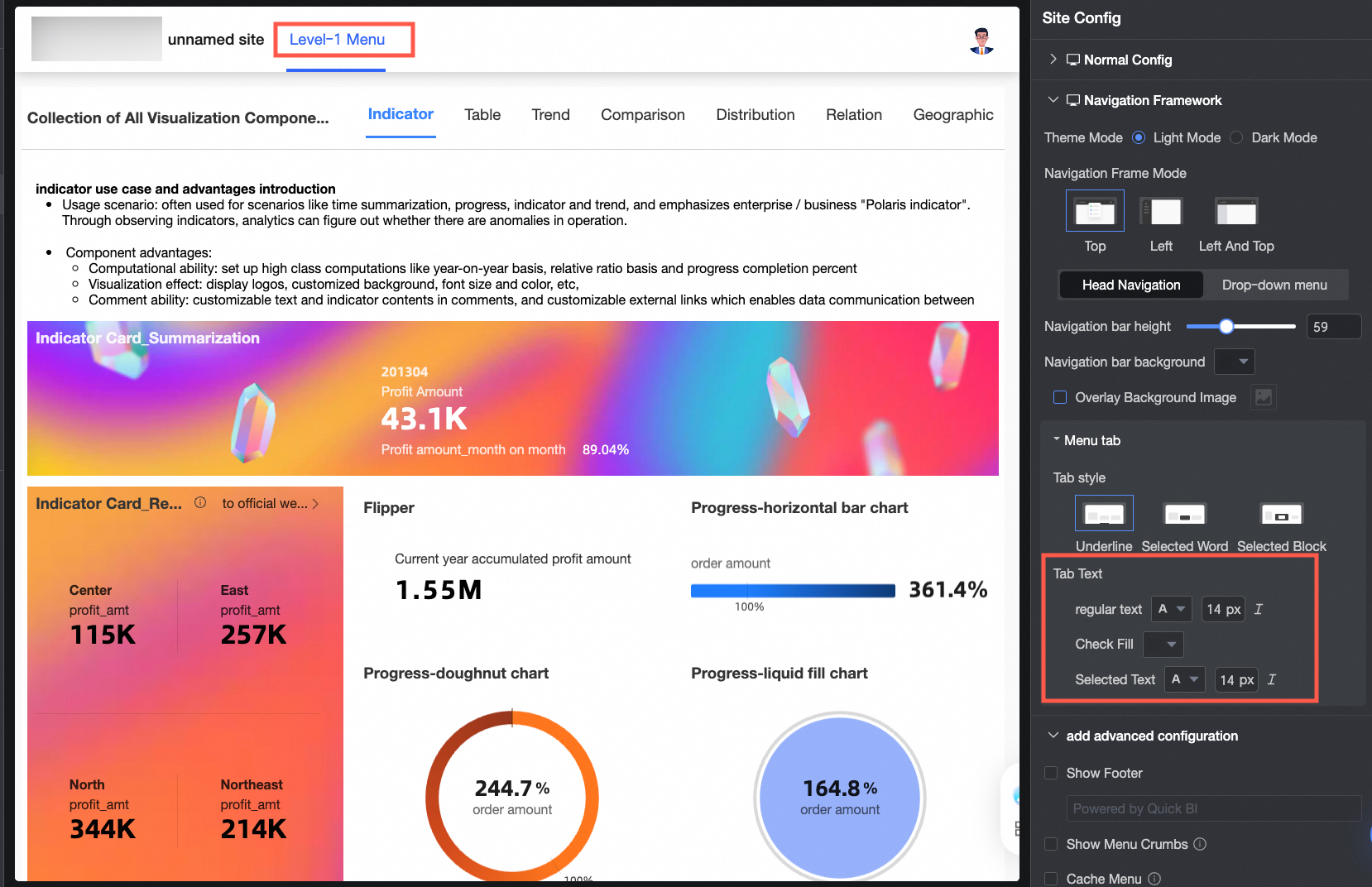
Drop-down menu
When the navigation frame pattern is set to top navigation layout, support configuring drop-down menu.
Navigation menu area background
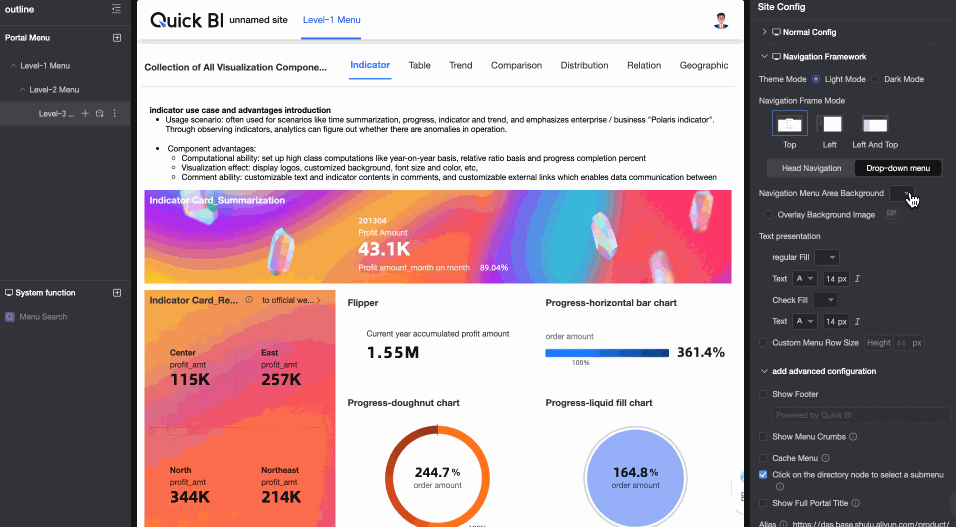
Overlay background image
After selecting, support uploading custom images. Uploaded local images only support jpg, jpeg, png, gif, svg formats, maximum 1M.
Text display
Support setting regular and selected fill color and text style.
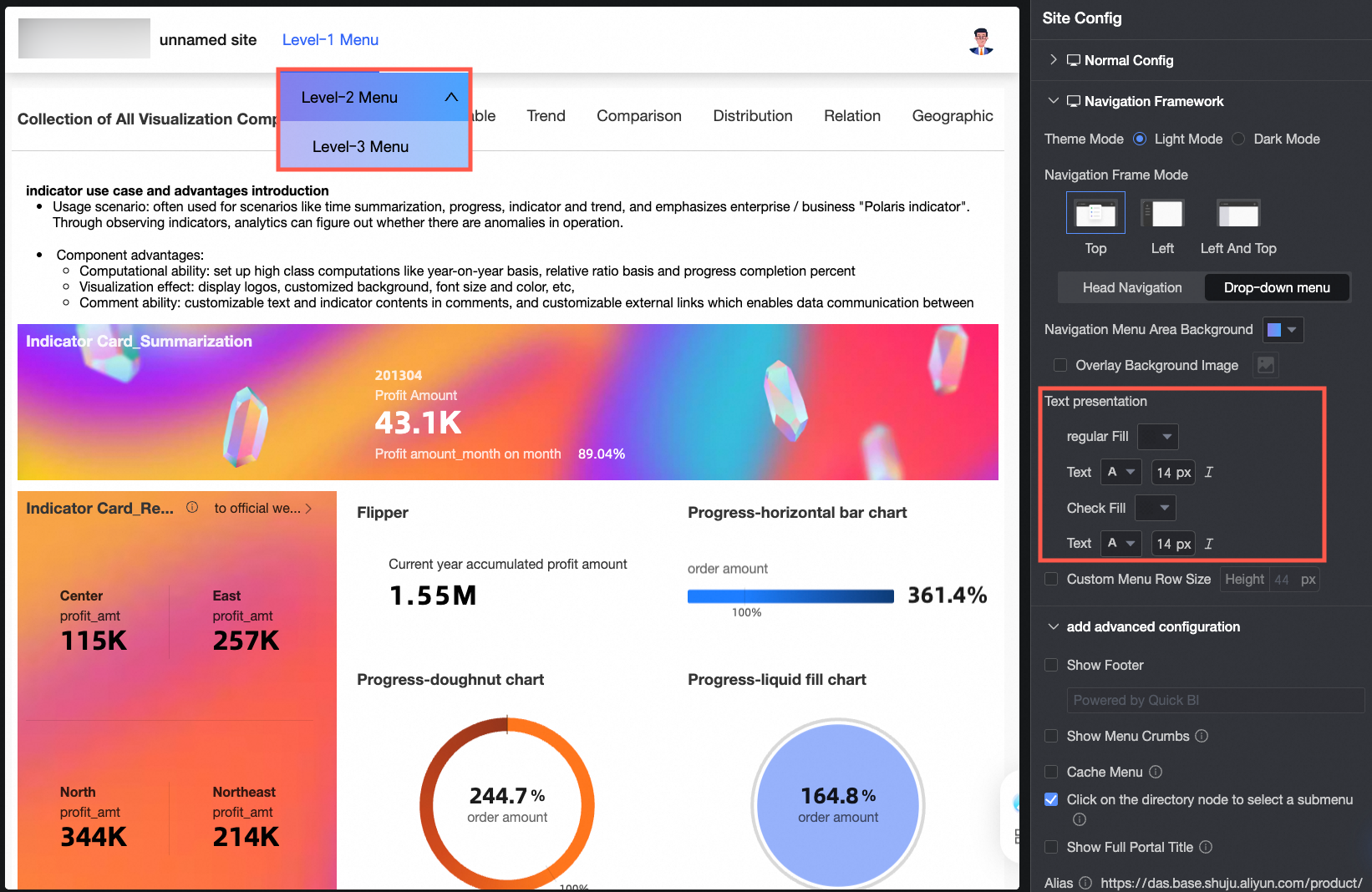
Custom menu row size
Set the height of the menu row.
Left Navigation Layout
Configuration item
Description
Logo display area color
Support setting Logo display area color to solid color or gradient.
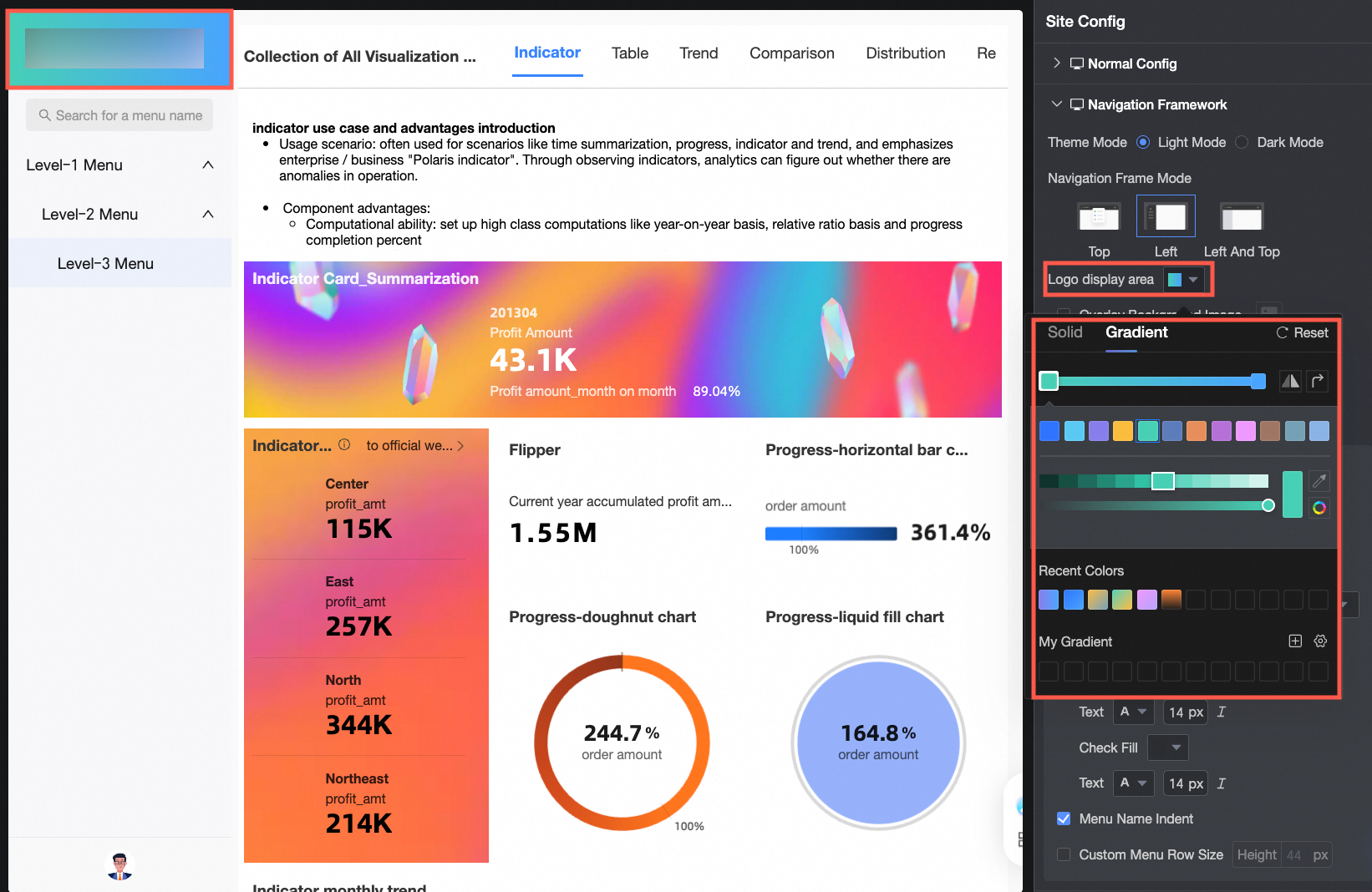
Overlay background image
After selecting, support uploading custom images. Uploaded local images only support jpg, jpeg, png, gif, svg formats, maximum 1M.
Panel configuration
Navigation bar background

Overlay background image
After selecting, support uploading custom images. Uploaded local images only support jpg, jpeg, png, gif, svg formats, maximum 1M.
Menu display configuration
Menu selected style
Support fill and selected block.
Menu level and text display
Support setting text display style for all menu levels or specified menu levels.
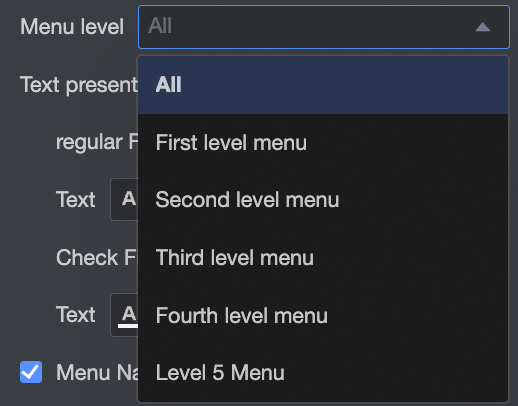
Menu name indent
After selecting, the lower-level menu name is indented.
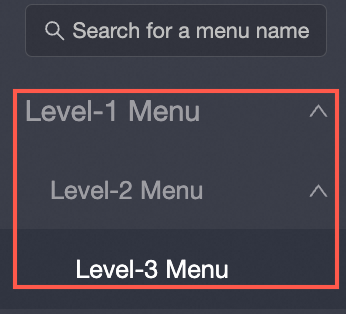
When not selected, all menu names are on one column.
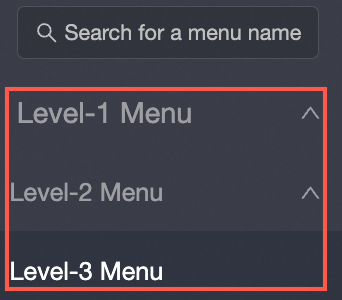
Custom menu row size
Set the height of the menu row.
Dual Navigation Layout
Configuration item
Description
Header navigation
When the navigation frame pattern is set to top navigation layout and dual navigation layout, support configuring header navigation:
Navigation bar height
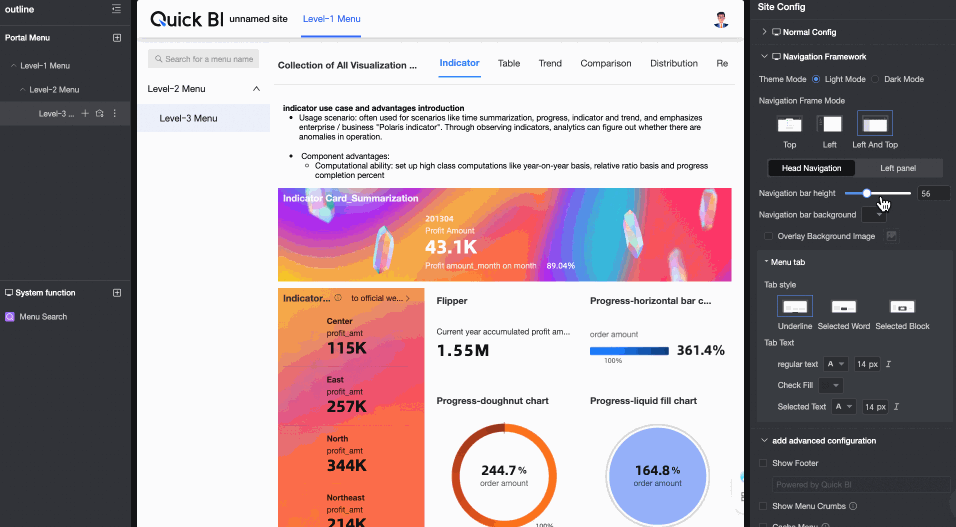
Navigation bar background
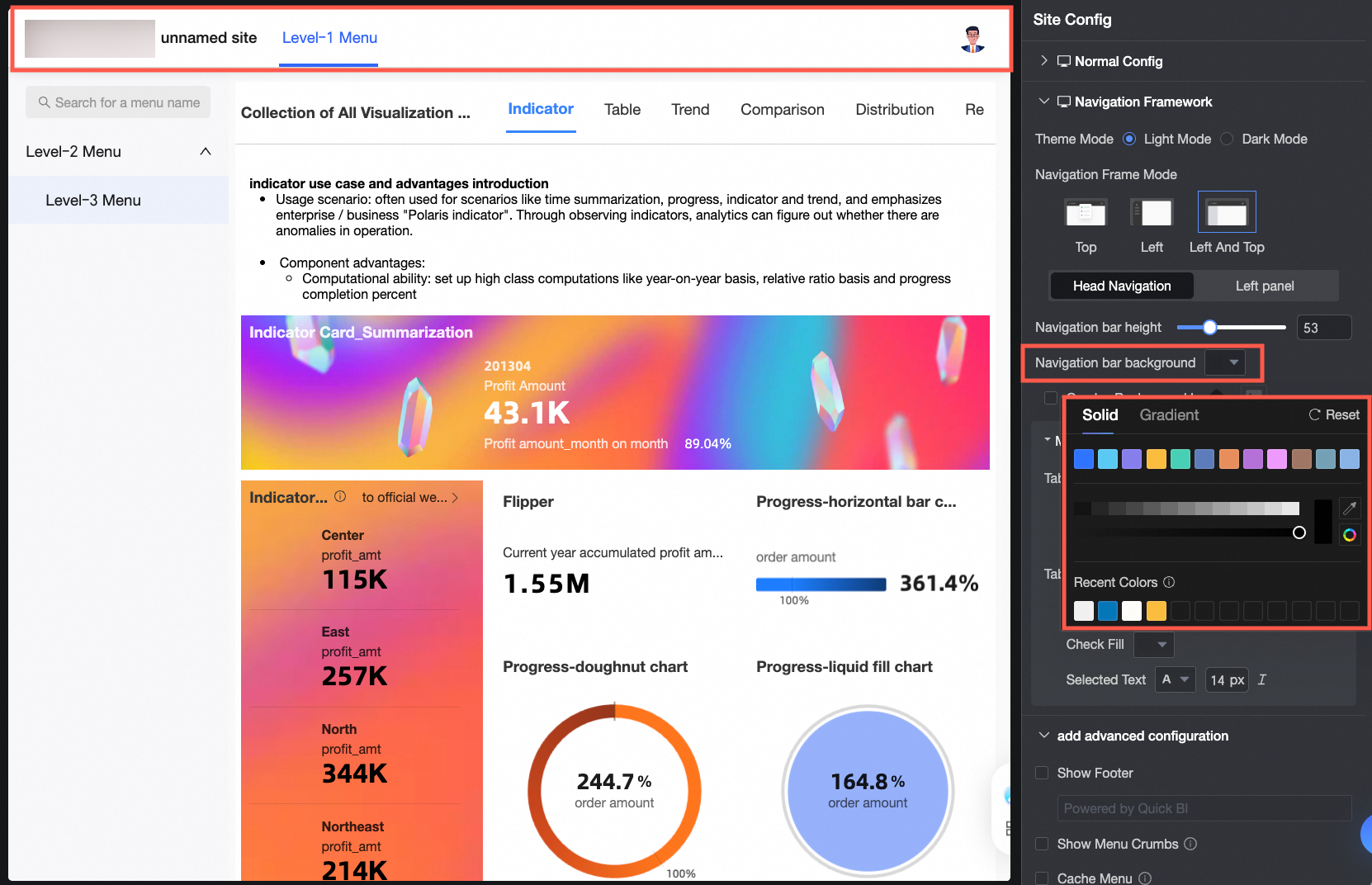
Overlay background image
After selecting, support uploading custom images. Uploaded local images only support jpg, jpeg, png, gif, svg formats, maximum 1M.
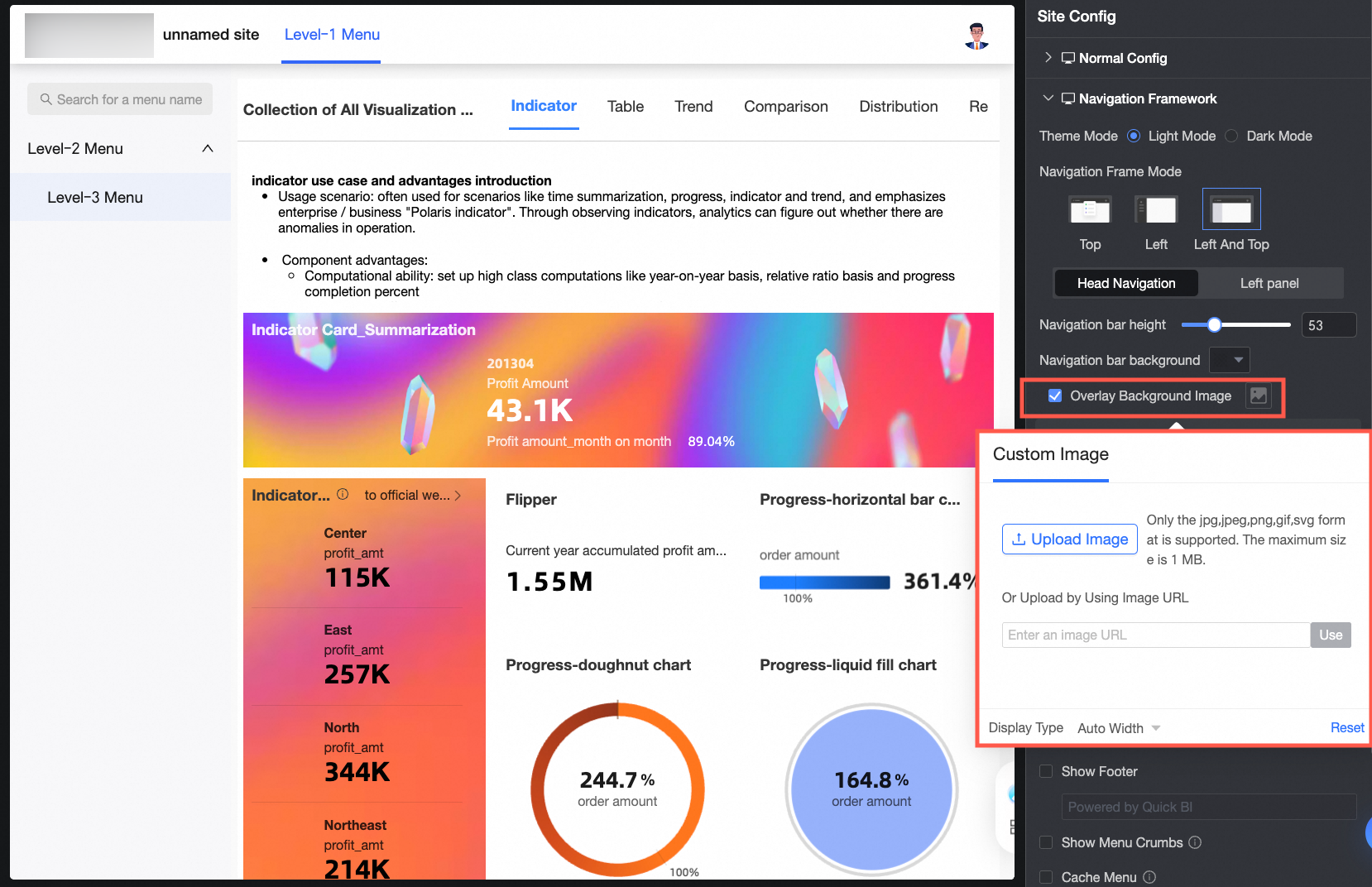
Tab style
Support underline, selected word, and selected block.
Tab text
Support setting regular text style, selected fill color, and selected text style. The selected fill color only takes effect in the selected block..
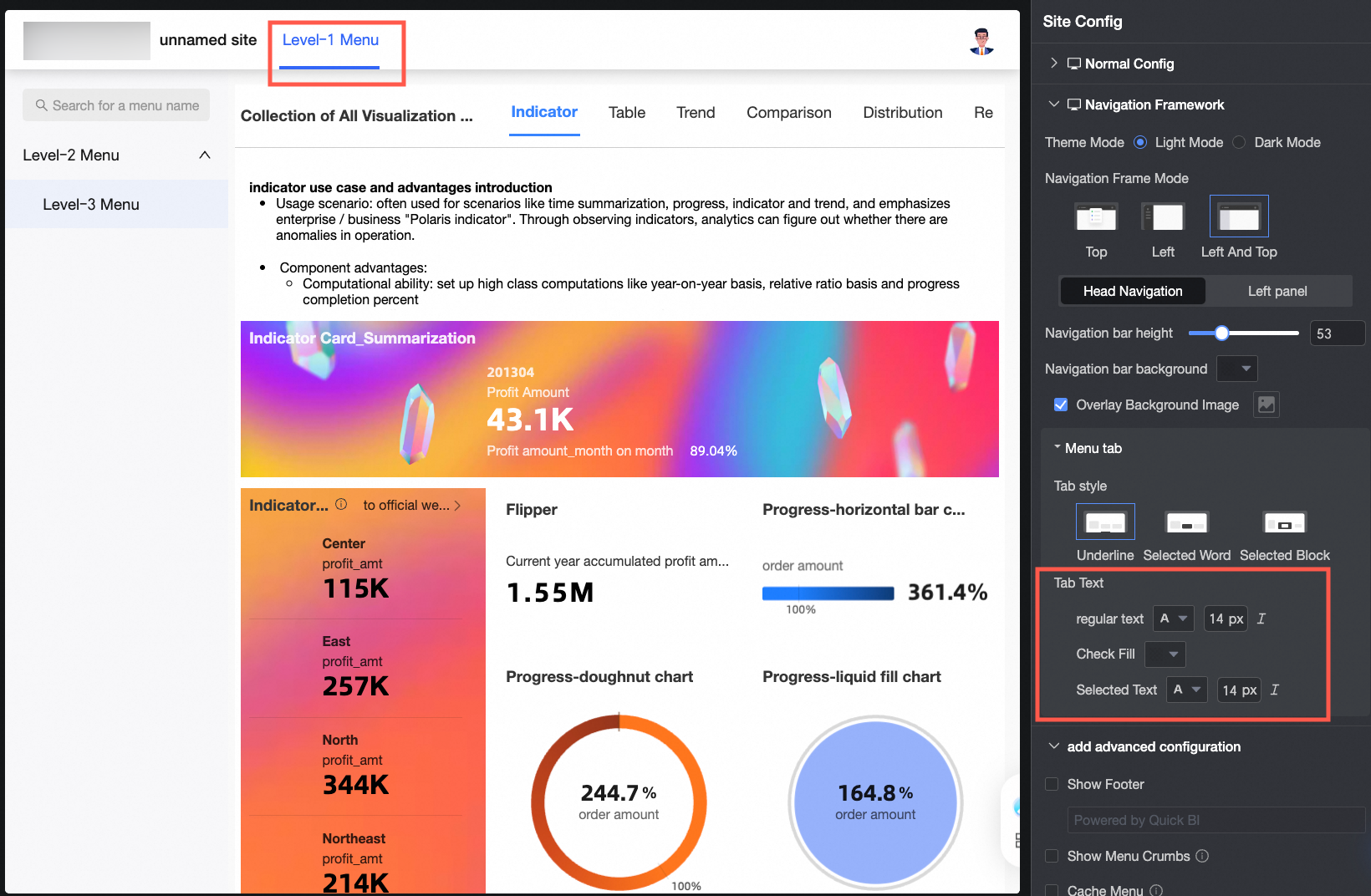
Left panel menu area
When the navigation frame pattern is set to dual navigation layout, support configuring left panel menu area.
Menu area background

Overlay background image
After selecting, support uploading custom images. Uploaded local images only support jpg, jpeg, png, gif, svg formats, maximum 1M.
Menu selected style
Support fill and selected block.
Menu level and text display
Support setting text display style for all menu levels or specified menu levels.

Menu name indent
After selecting, the lower-level menu name is indented.

When not selected, all menu names are on one column.

Custom menu row size
Set the height of the menu row.
Add Common Controls
The process for adding common controls on the PC is the same as on the mobile terminal.
Configuration item | Description |
Display footer | After selecting this option, you can specify the footer. The footer is displayed at the bottom of the content page. |
Menu level breadcrumb display | After selecting this option, the menu levels are displayed at the top of the content page.
|
Menu cache | After selecting this option, when you open multiple menus, menus do not need to be reloaded when you switch between the menus. |
Click directory node to select submenu | After selecting, clicking the directory node will automatically display the next level submenu. When not selected, in the top navigation and left navigation layout, clicking the directory node will only "collapse/expand" the menu list. In the dual navigation layout, this configuration item only takes effect on the left menu. |
Display full portal title | In dual navigation/top navigation, when the title is too long, it is displayed in full by default. |
Portal alias | You can specify a custom parameter that is appended to the URL. For example, if you enter the parameter 1, the portal alias is
Note Please enter content that complies with laws and regulations. Do not enter any illegal, pornographic, reactionary, or unethical information. |
Menu Configuration
PC menu configuration is distinct only in terms of menu display styles, while the rest of the settings are shared with the mobile terminal.
Navigate to the BI portal editing page and click the desired menu to access its Configure Menu page.

On the Configure Menu page, configure the Portal Menu, System Features and Menu Settings.

Portal Menu Configuration

① Add a main menu. This creates a level-1 menu.
② Add submenus for level-2 and below.
③ Designate a menu as the homepage, which will be displayed by default when the BI portal is accessed.
④ Delete a menu.
System Features Settings
You can select Menu Search and Page Full-Screen features as illustrated below.
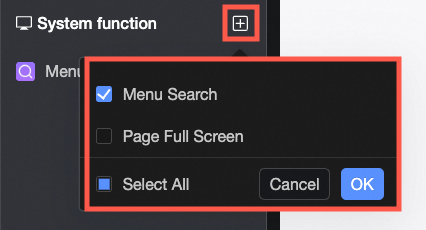
Menu Search
When Menu Search is selected and displayed, you can search for menu names.
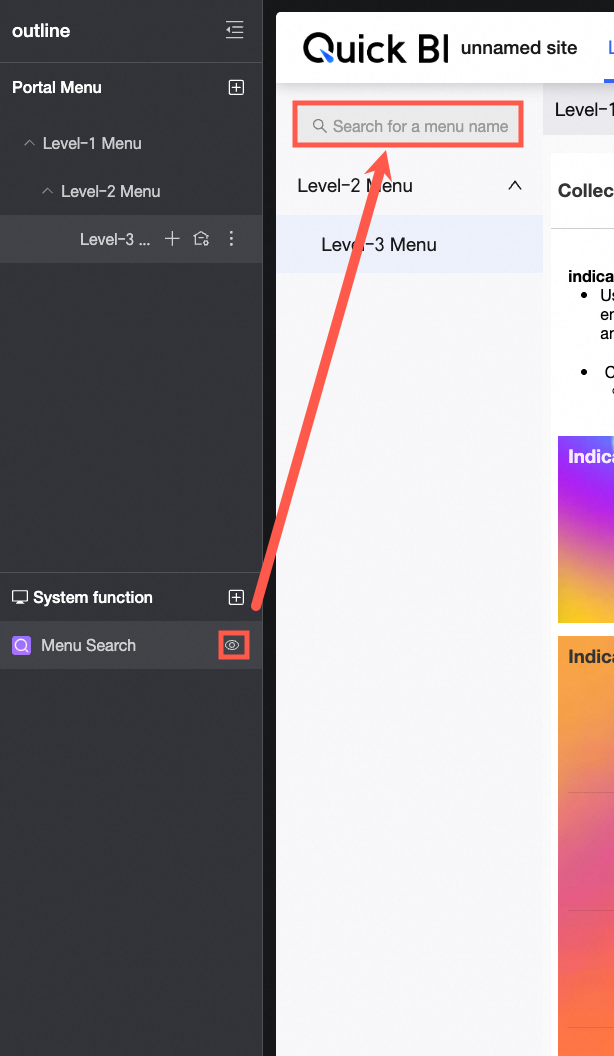
You can configure the background fill color, icon color, line frame color, and text style for empty state and input state of the search box.
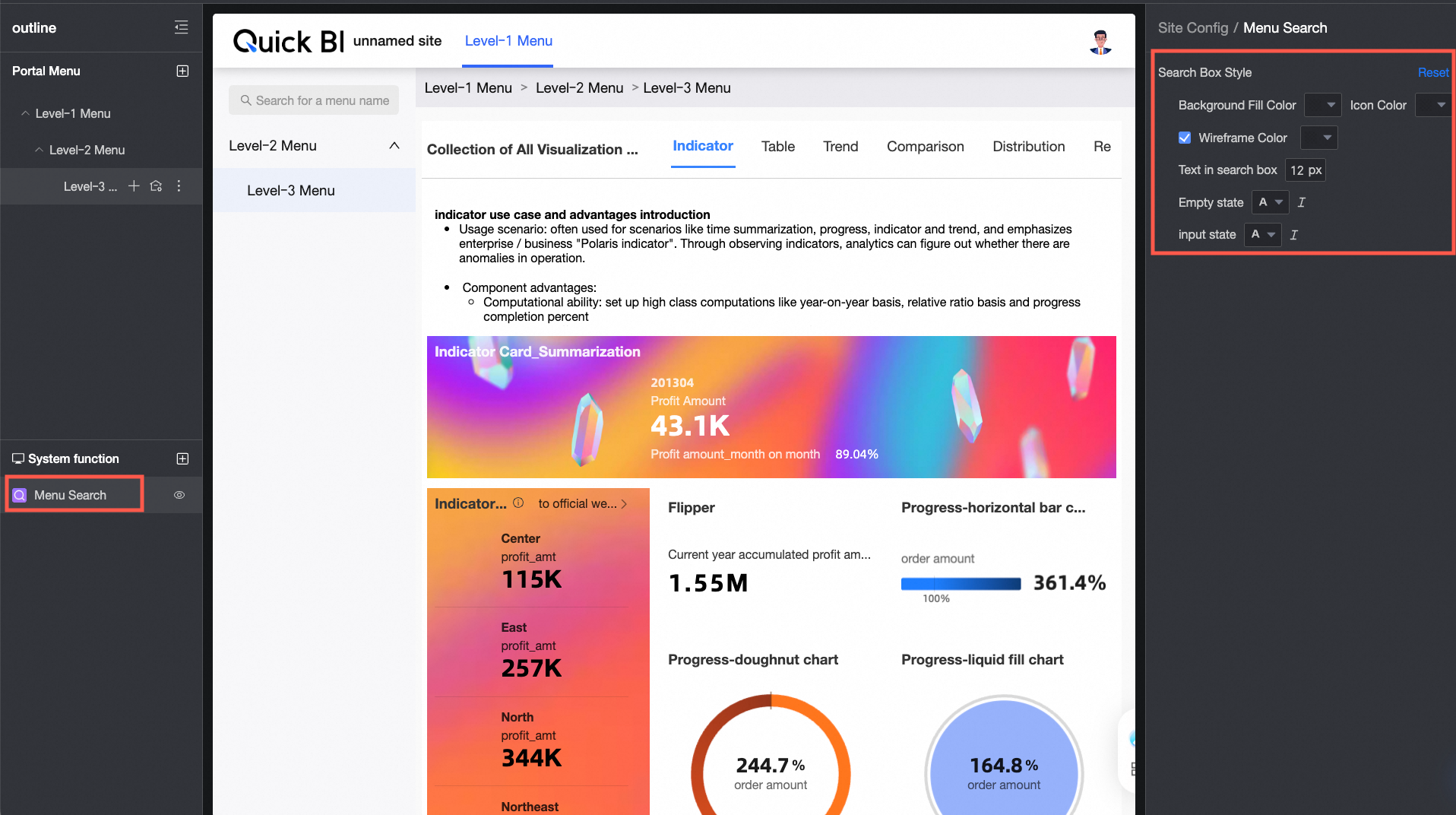
Page Full-Screen
When Page Full-Screen is selected and displayed, the page will show a full-screen button and allow full-screen operations.

You can configure the function icon to use either materials or custom images.
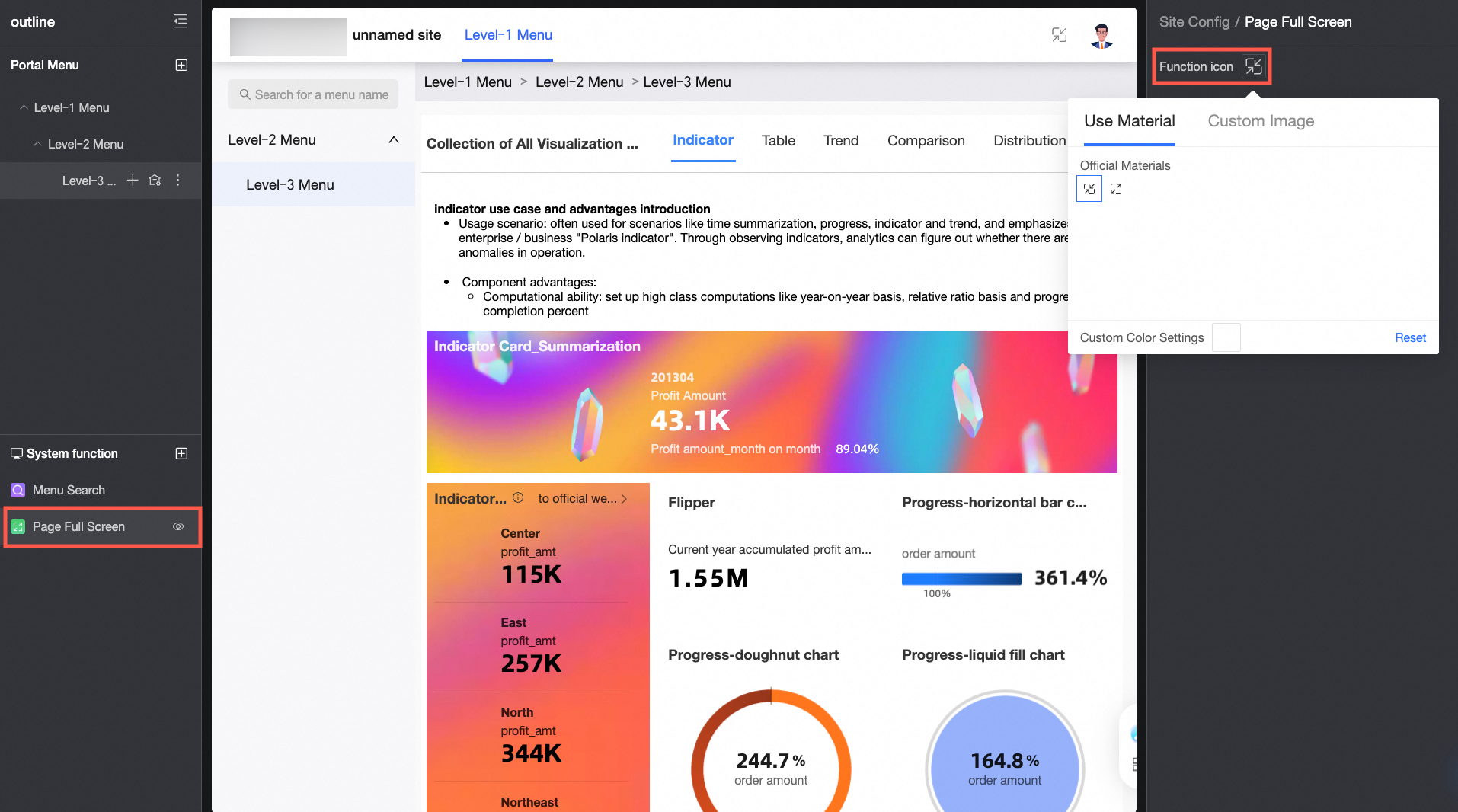
Uploaded local images only support jpg, jpeg, png, gif, svg formats, maximum 1M.
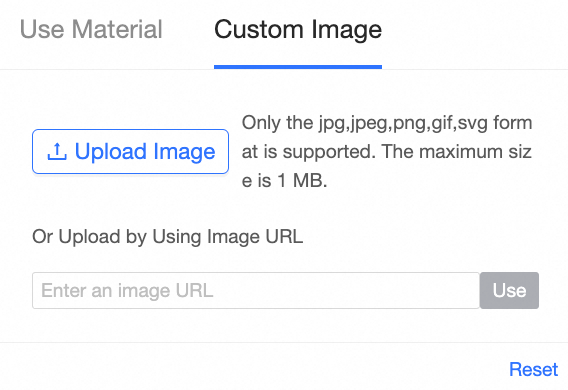
Menu Settings
Configuration item
Description
Menu name
The name of a menu.
Allow collapse
Specifies whether a menu can be folded.
Default collapse
Specifies the default state of a menu.
NoteThis option can be set only when Allow menu collapse is selected.
Node type
Set the node type to content node or empty node.
If a node is specified as a parent node, you can configure this node to an empty node.
When a child node is added under this node, the node automatically becomes an empty node. If the node was originally a content node, adding a child node will clear the node content.

Content type
Support setting space resources or external links. The space resources supported by the mobile BI portal include the following types:
Dashboard
Data dashboard
Workbook
Ad hoc analysis
Data reporting
Downloads
When the space resource is a dashboard, workbook, ad hoc analysis, or downloads, you can choose whether to display the report title.
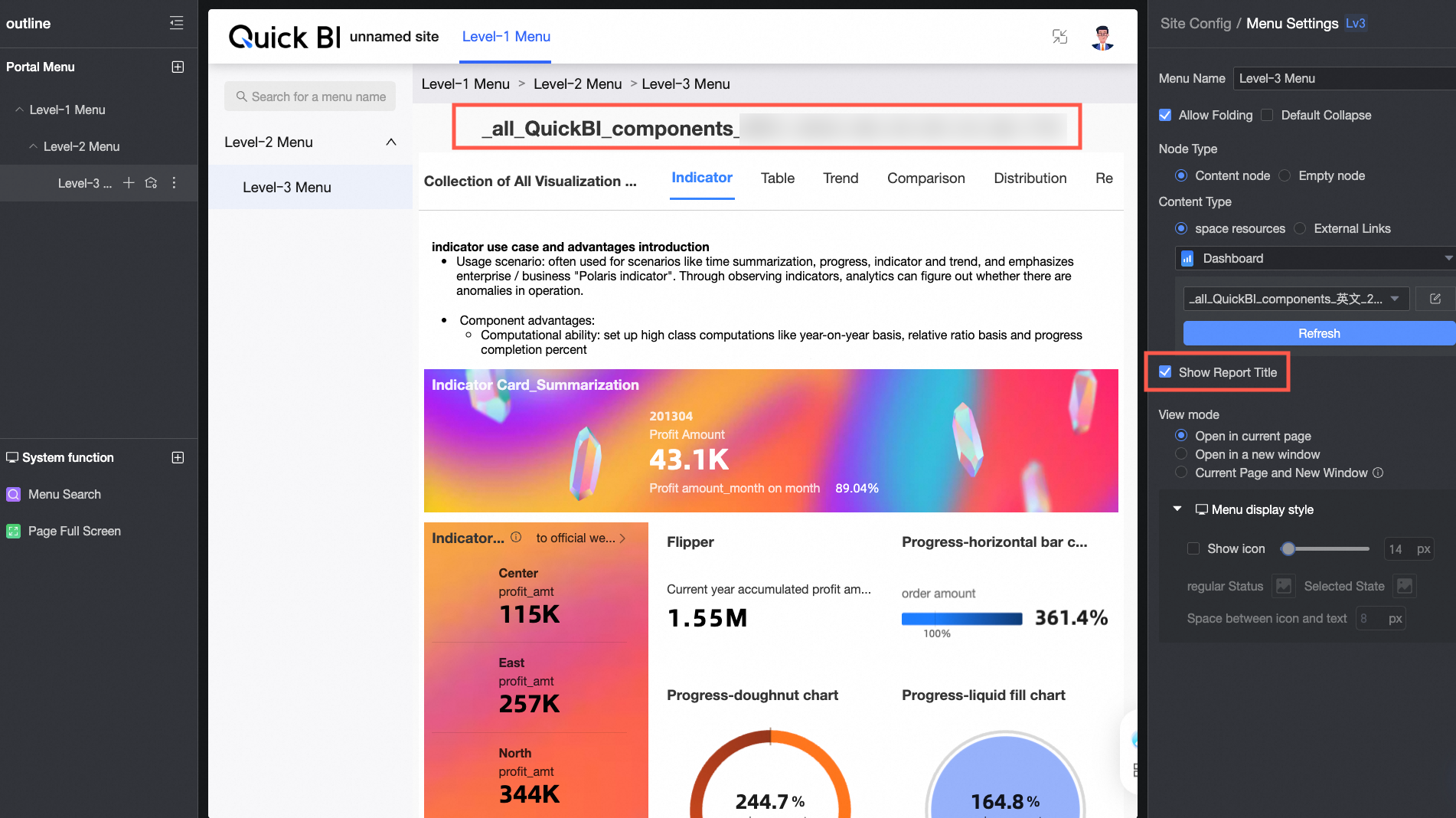
Viewing method
Support open in current page, open in new window, and open in current page and new window three methods.
NoteThis option can be set only when the menu is not set to an empty node.
If you have selected a unified page opening method in the site configuration, you cannot customize the opening method for a single menu page. To customize the opening method for a single menu page, modify it to custom viewing method for each menu page.

Menu display style
Lets you show or hide the menu display. You can also select Display icon and configure the icon size, the menu icon for normal and selected states, and the spacing between the icon and text.

You can customize the display status of the menu on PC and mobile clients. If you choose to hide the menu on a PC client, the menu and its submenus are no longer displayed. The menu display on mobile clients is not affected. To configure the menu display for mobile clients, perform the settings when you create a mobile BI portal.

The menu icon can be a material or a custom image.
Use material
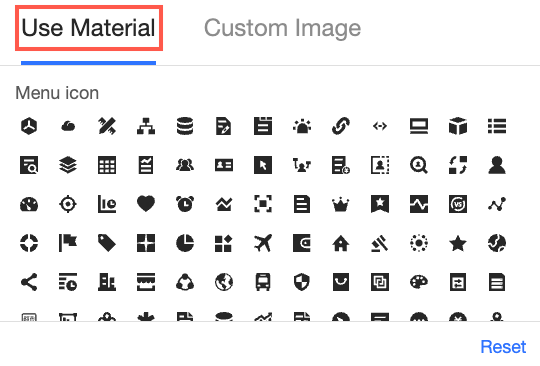
Custom image
You can upload a local image (①) or upload an image using an image URL (②).
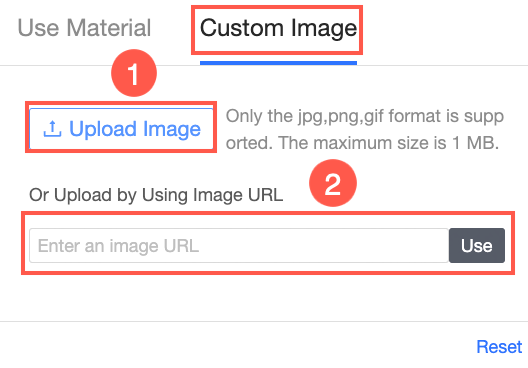
Click Save.
You can adjust the width of the navigation pane on the left by dragging it.
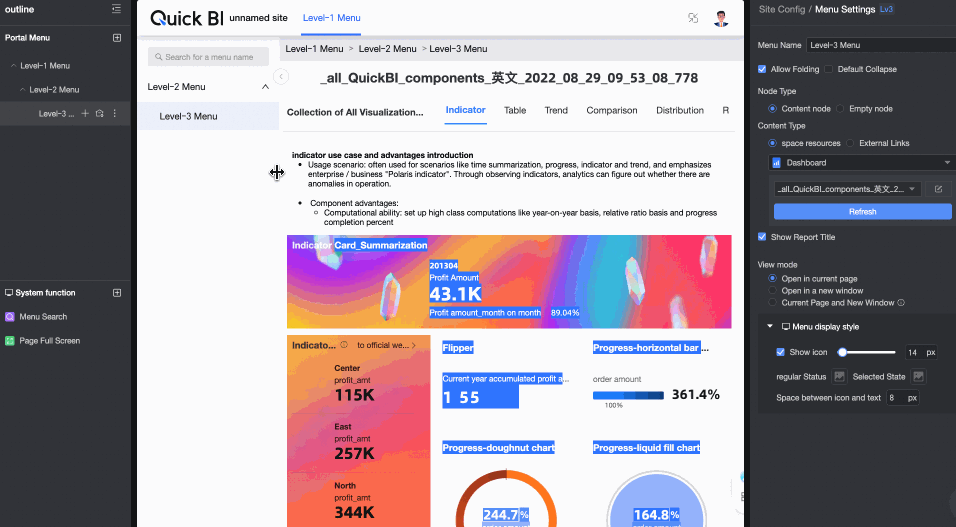
Theme configuration
On the BI portal editing page, click the
 icon in the upper right corner and locate the icon at the bottom to toggle between the light and dark theme modes of the BI portal.
icon in the upper right corner and locate the icon at the bottom to toggle between the light and dark theme modes of the BI portal.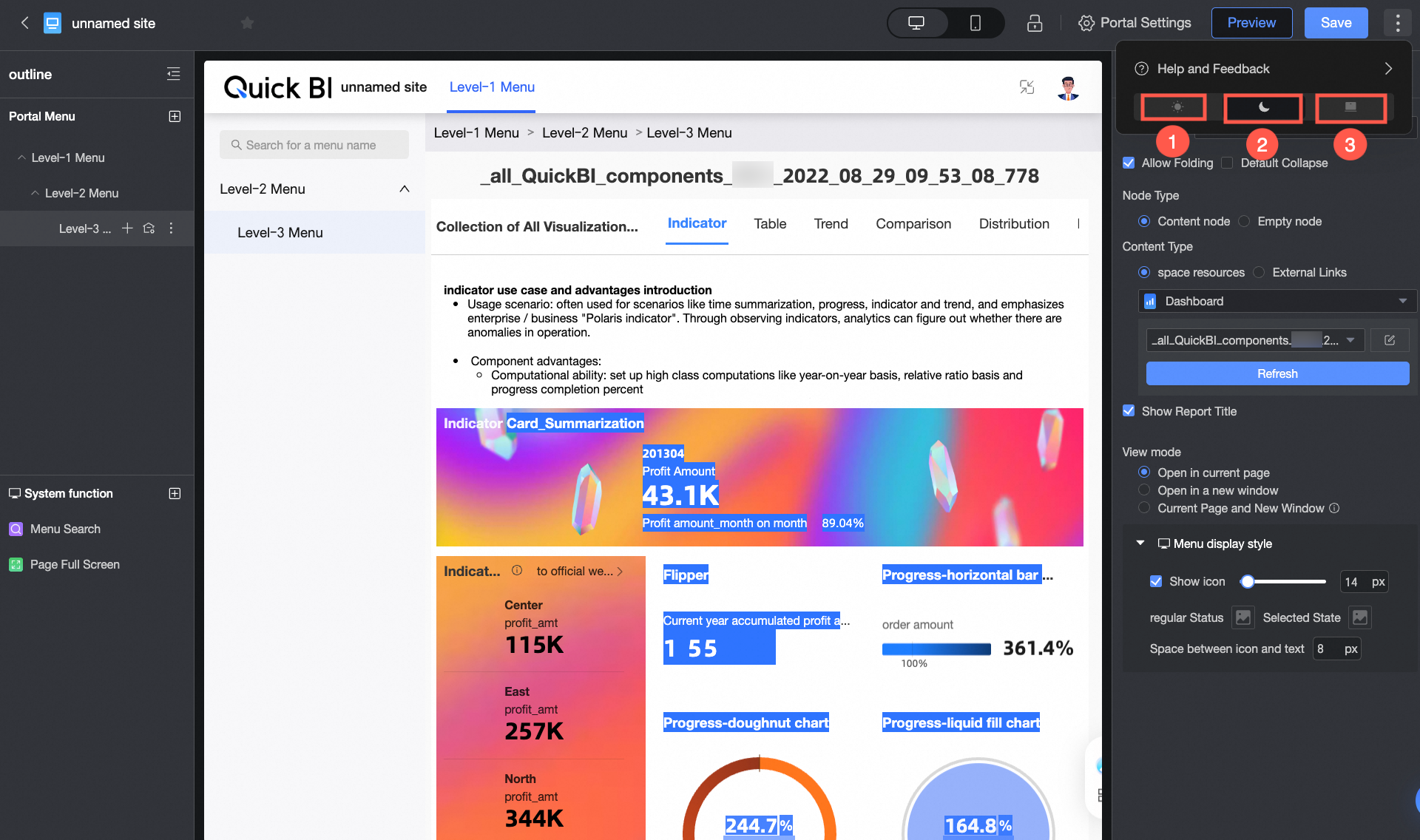 Note
NoteSwitching between light and dark theme modes affects the account level, not just individual modules. For instance, setting the workbook to light mode will also change compatible modules (such as dashboards and data reporting) to light mode.
① Light Mode
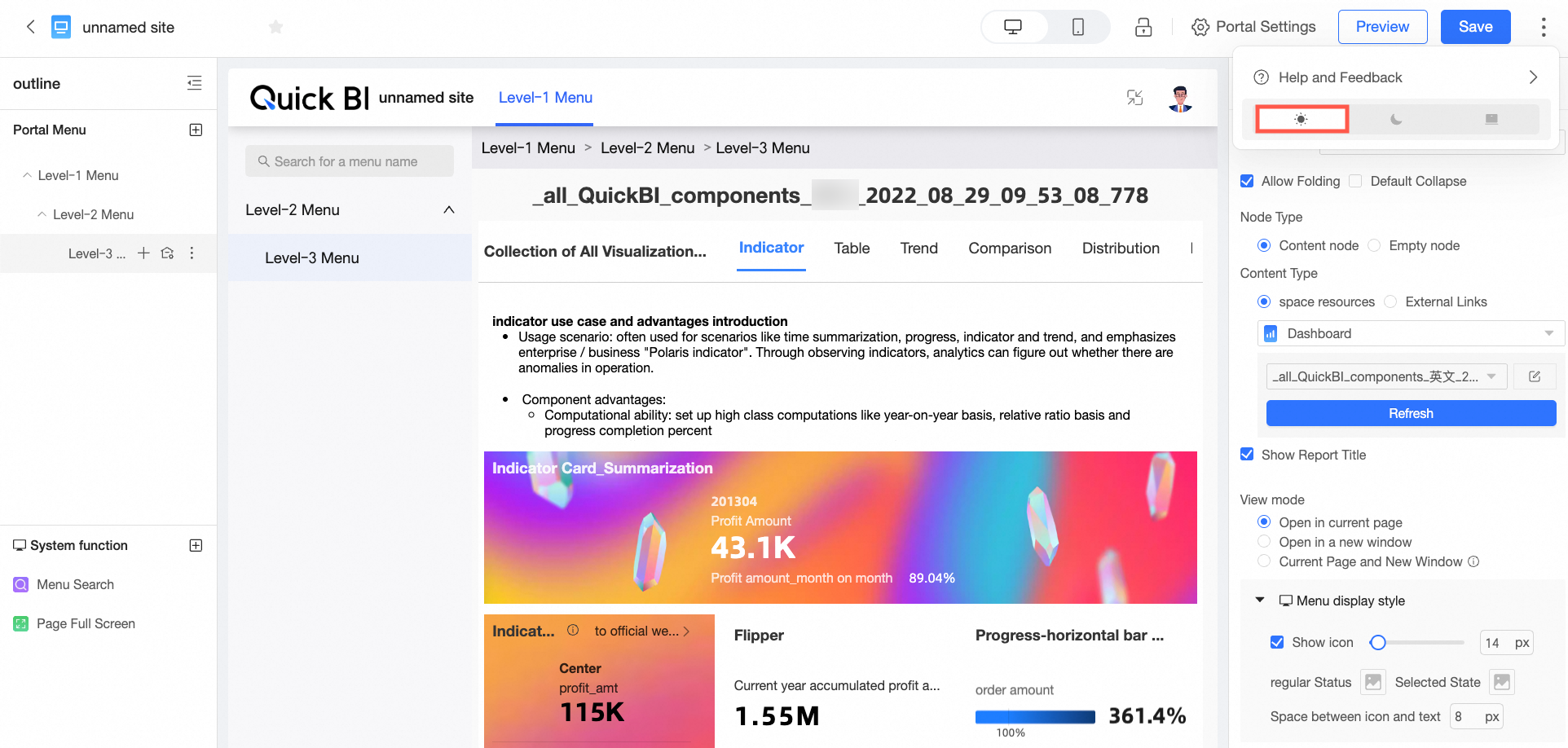
② Dark Mode
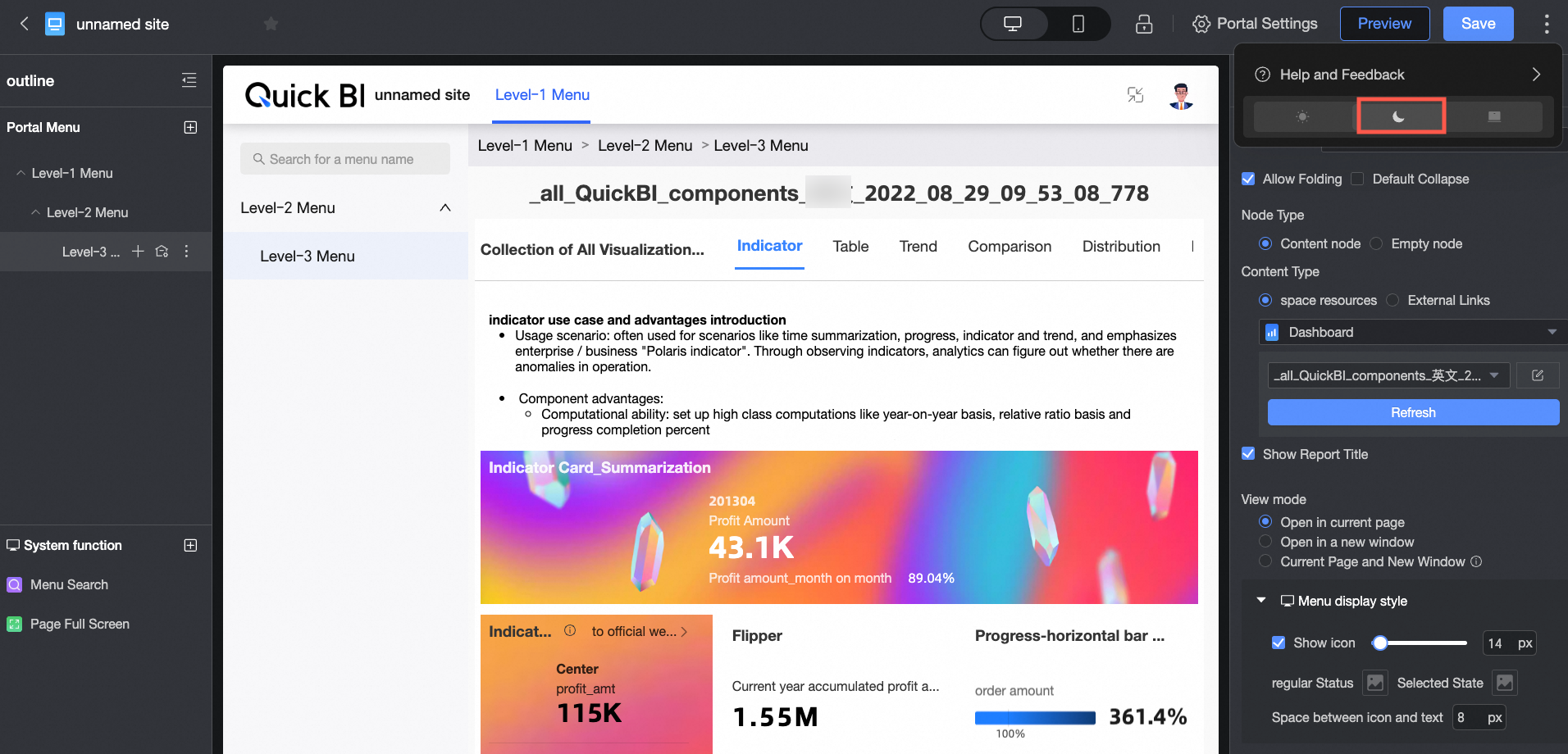
③ Follow System
Adopt the system style in custom configurations.
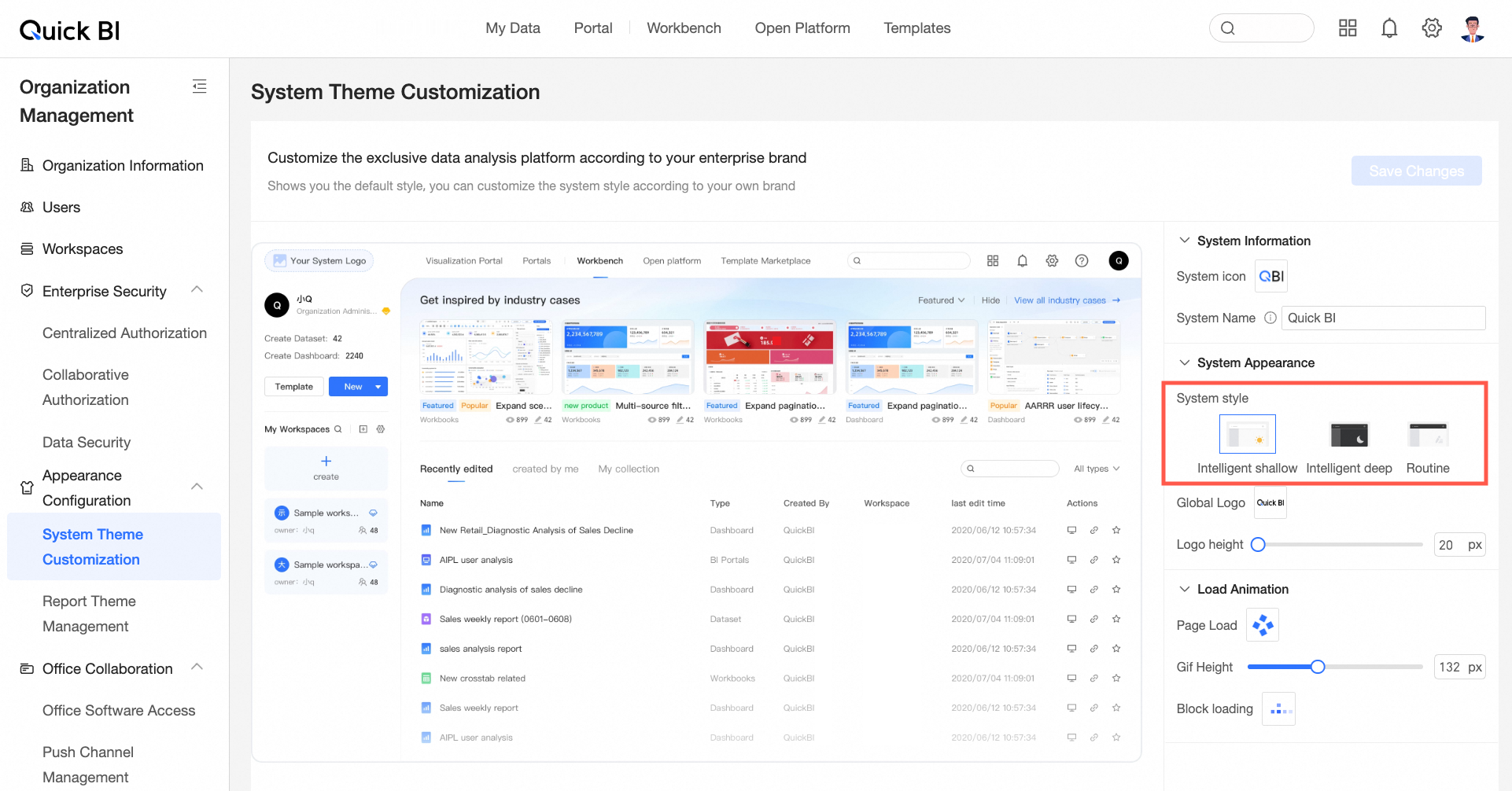
For more information, see System Theme Customization.
NoteSystem style settings in custom configurations are only available within Organization Management. Module-level settings take precedence over organization-level effects.

